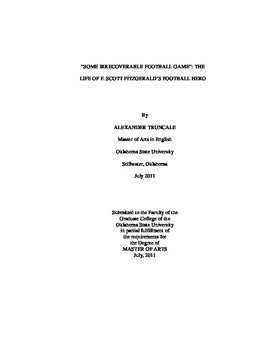| dc.description.abstract | The purpose of this study is to explore two of F. Scott Fitzgerald's novels The Great Gatsby and This Side of Paradise as well as his short story "The Bowl" in order to explore Fitzgerald's attitude toward football, the archetypal collegiate football hero of the 1920s and 1930s, and how Fitzgerald's own football failings shapes his narration in the above mention narratives. The portrayal of the football hero is different in each of the three above mentioned works. The study is set up as follows: The introduction opens with a brief anecdote, illustrating the hero worship of the football player in the early twentieth century that mirrors the hero worship of sports superstars in contemporary society. The first section continues with an examination of Fitzgerald's own experiences with football, beginning with his first published poem, "Football," written while Fitzgerald was in secondary school. It also covers his brief time as a member of the Princeton football team. The second section delves into the concept of the football hero and into the football-playing characters portrayed in This Side of Paradise and The Great Gatsby. In the former, Fitzgerald describes football glory whereas in the latter the narration takes a much more negative attitude toward the football player of the story. The third section examines "The Bowl," Fitzgerald's only true football story, and argues that it gives the most complete account of the life of a football hero. The final section, a conclusion, reasserts that, despite Fitzgerald's success as an author, the dream of football always eluded him. Based on Matthew J. Bruccoli's definitive biography, Fitzgerald had an overwhelming desire to become a college football hero, almost to the point of obsession. While Fitzgerald had a largely successful career as a writer, and while most his narratives discuss economic class and the plight of the "Lost Generation," football, though only an afterthought in many of his works, captured Fitzgerald's attention in a way that influenced his desires both as an adolescent and as an adult, as well as his authorship. In This Side of Paradise, The Great Gatsby, and "The Bowl," Fitzgerald is able to portray the football hero in a variety of situations and demonstrate how the football hero leads a life that is both similar and dissimilar to that of the average person. | |
